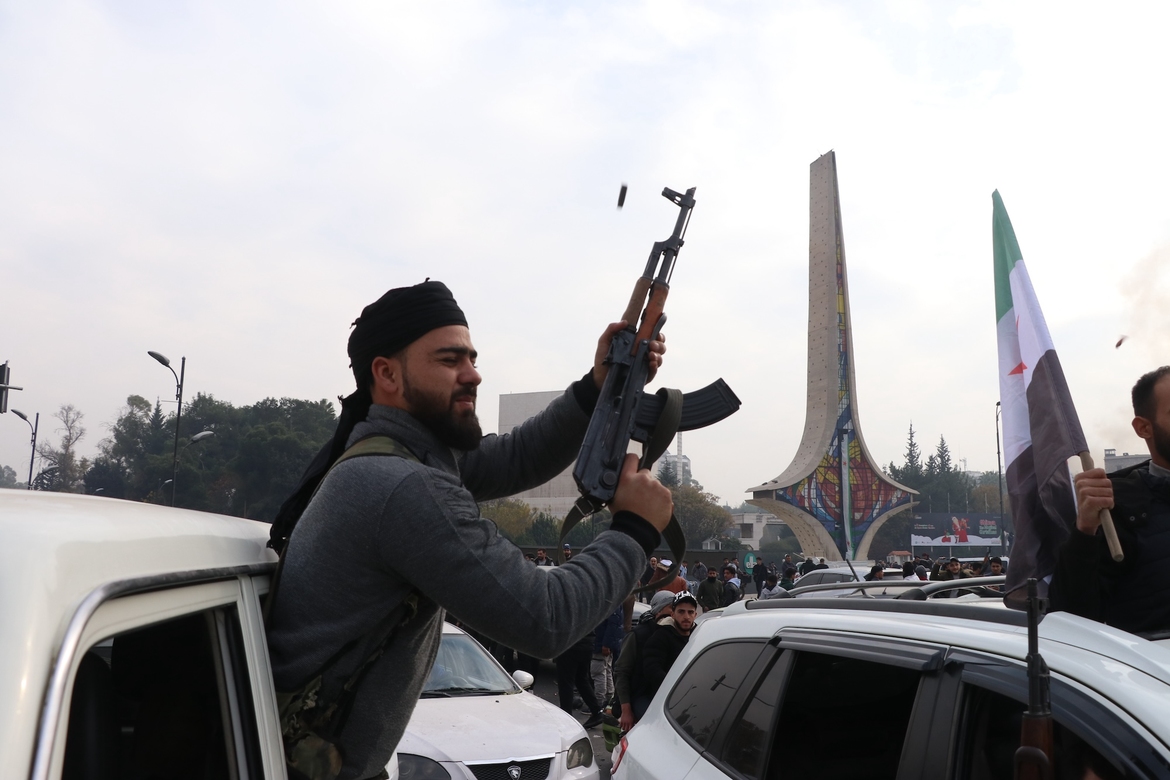Fear for the Future of Christians in Syria
Syria: Despite assurances from militias about the safety of Christians, fear for the future remains.

A rebel fighter celebrates the fall of Bashar al-Assad.
Written by: Johannes Morken. Photo: Shutterstock. Originally published in Klassekampen, 12.21.24.
"We're done with the criminal Assad. But I’m unsure about the future under the people who have taken over," said George Andrea from the Bible Society in Syria in a video interview from Aleppo. The northern city was the first to fall to the rebels, who overthrew Assad’s brutal regime in just 12 days.
"What awaits us? Will they truly accept us Christians, as they’ve promised? Or will we face the same fate as Christians in Iraq? Their roots are in fundamentalist Islam," Andrea explained.
Militia leaders have encouraged Christians to remain in Aleppo, but some have not dared. George Andrea shared photos from a December 9 meeting between church leaders in Aleppo and the militia leaders, who seemed intent on building trust, according to Fides, the Vatican’s news agency. Christian schools, where boys and girls study together, are to continue, and Christmas will still be celebrated, though with less fanfare.
Two hundred Christian students were safely evacuated to the self-administered Kurdish region in northeast Syria. This effort was coordinated between churches in Aleppo and militia leaders, according to another church source. Emanuel Youkhana, based in the Kurdish region of Iraq, maintains close contact with colleagues in neighboring Syria.
Islamist Militias
The militia Hayat Tahrir al-Sham (HTS), which began in Aleppo before ultimately taking Damascus, has distanced itself from its origins in Al-Qaeda. However, HTS still pursues an Islamist agenda. Its leader, Abu Mohammed al-Jolani, proclaimed an Islamic nation from the Umayyad Mosque. Whether protections for minorities will last remains to be seen.
There are some positive signs, though. When armed men attacked an Orthodox church in Hama on December 18, security forces arrived to protect the building and arrested the perpetrators. Similarly, when a cemetery in a Christian village near Hama was vandalized, security forces promised to address the issue.
Fear in the Kurdish Region
However, the situation is more volatile in northeastern Syria, where other jihadist groups, including the Syria National Army and remnants of ISIS, remain active. Armed jihadists from Chechnya also operate in the region.
In the de facto self-administered Kurdish area, there is "explicit and serious fear for the future" among Christians and other minorities, says Youkhana. Will the new leaders in Damascus view the Kurdish SDF as partners, or, like Turkey, label them terrorists and crush the self-administration? Christians, Kurds, and other minorities face pressure from both jihadists and Turkey. Christians who have supported the Kurdish SDF have particular reason to be fearful.
The Biden administration has assured that U.S. troops will remain in the region, but will future U.S. leadership, such as Donald Trump, leave the Kurdish self-administration and minorities to fend for themselves?
The fall of Assad was a common goal for many, but the path forward is far more uncertain. To hope for a future without armed conflict may be naive.
Another Iraq
The fall of Assad was a common goal for many, but the path forward is far more uncertain. To hope for a future without armed conflict may be naive.
In the worst-case scenario, Syria could become for Christians and other minorities what Iraq became after the fall of Saddam Hussein in 2003. Emanuel Youkhana recalls how, just a few years after the U.S. invasion, civil war erupted. Bloody militia attacks on Christians and other minorities forced many to flee to northern Iraq or leave the country entirely—long before the rise of ISIS. Of Iraq’s 1.3 million Christians, only a few hundred thousand remain today.
The Syrian civil war has already driven half of the country’s Christians to flee. A friend of mine from Damascus escaped with his family to Norway in 2015. While he and his relatives in Syria remain optimistic, others are deeply anxious.
Christian Presence in Damascus
When I first visited Syria in 2000, I walked the "Straight Street" in Damascus, mentioned in the Book of Acts in the Bible. For 2,000 years—just as long as in Jerusalem—there has been a Christian presence in this city.
Leaders of Syria’s largest churches spoke to me then about the freedoms they enjoyed under the Assad regime. There was even some optimism at the time, as the young ophthalmologist Bashar al-Assad had returned from London to take power. But Bashar would prove to be just as brutal as his father. When he violently crushed the Arab Spring in 2011, many church leaders supported him, seeing him as a safer option than jihadist groups.
When I met Syriac Orthodox Patriarch Aphrem II two years ago during his visit to Iraq, he told me in an interview: "We are accused of taking sides and being collaborators. But for us, it’s about the country and its people. That’s why we cooperate with the government. Personally, I believe President Assad is a good man; he defended the country and its people against terrorists."
These churches have been instrumental in providing aid during the civil war. They also protested Western sanctions, arguing that they hurt ordinary people more than Assad.
Still, a Syrian Christian leader who wishes to remain anonymous told me: "Collaborating with Satan always comes at a price." What that price will be remains one of many unanswered questions.
"We Love Muslims"
In Aleppo, George Andrea has no plans to leave.
"I want to find ways to work. I want to tell the new authorities about the Bible. Loving Muslims is not our weakness as Christians; it’s our strength. Jesus loves all my people. My hope is that many Muslim and Christian refugees will one day return home."